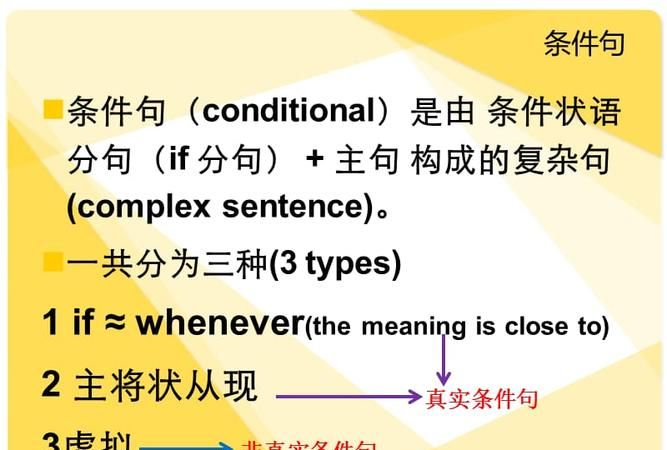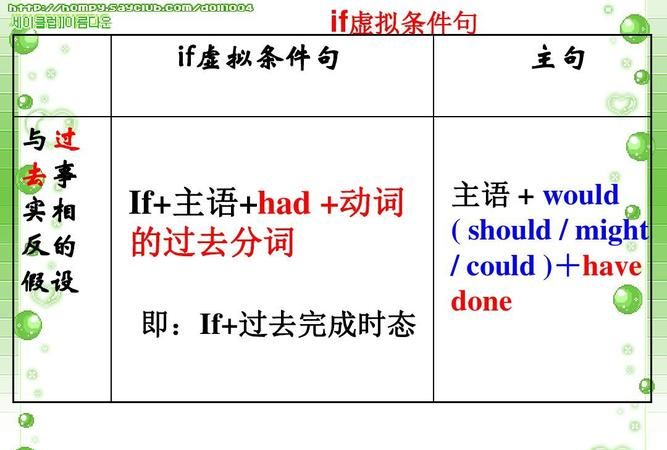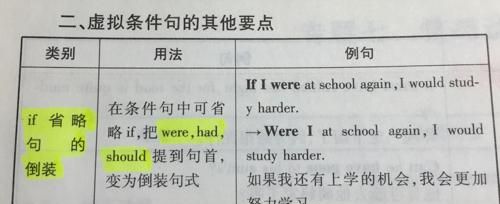本文目录
为什么要使用动词时态
有例句没?如果是if条件状语从句的话,如If you give me one billion dollars , I'll return the President to you .(如果你们给我十亿美圆,我就把总统还给你们。)这里头就是一般将来时表条件成立后将会发生什么事。当然条件If条件状语从句还有情态动词的,如If you kill the President , you can't be forgiven . (若是你杀了总统,你就不会被原谅。)
这就是if条件状语从句中主句与从句的时态不一致的情况。
还有就是虚拟语气,全用过去时态。如:
If I could fly , I would fly to the moon,to stars,to far distant places.
如果我能飞翔,我要飞往月球,飞往星辰,飞向远方。
If he hadn't finishied this work,he can't be so fast.
如果他还没有完成这项工作,那么他就不可能这么快。
注意,虚拟语气里,无论主语是单数还是复数,be动词全用were。

if条件句中绝对不可出现would
虚拟语气分三种情况来掌握:
1、虚拟条件句。
2、名词性虚拟语气。
3、虚拟语气的其他用语。
一、虚拟条件句: 条件状语从句是非真实情况,在这种情况下要用虚拟语气。
1、条件从句与现在事实不一致,其句型为:
If 主语+过去时,主语+should(could, would, 或might)+动词原形,
如: If I were you, I would study hard. If it rained, I would not be here now.
2、条件从句与过去事实不一致,句型为:
If 主语+had+过去分词,主语+should(could, would, 或might)+have+过去分词,
如: If the doctor had come last night, the boy would have saved. If I had not studied hard, I would have failed in the exam last term.
3、条件从句与将来事实不一致,句型为:
If 主语+should(were to, 过去时)+do,主语+should(could...)+原形do,
如: If it should rain tomorrow, we would stay at home. If I were to go to the moon one day, I could see it with my own eyes. If you missed the film to night, you would feel sorry.
注意问题:
1、If条件句中绝对不可出现"would"。
2、根据句中的时间状语,有时可能出现“混合虚拟”的情况,即主句可能是现在的情况,条件句也许是发生在过去的情况,但都是遵守上述句型。
3、在条件句中如果出现were, had, should可省去if,将主语与这些词倒装,例如: Had the doctor come last night, the boy would have saved. Were I to go to the moon one day, I would see it with my own eyes. Should it rain tomorrow, we would stay at home.
二、名词性虚拟语气: 在表示命令、建议要求、惊叹时的名词性从句中需用虚拟语气,
基本句型:主语+(should)+动词原形,
如:Mother insisted that John go to bed at 9 o'clock.(宾语从句) We suggested that the meeting should not be held. It was required that the crops should be harvested at once.(主语从句) The suggestion that he be invited was rejected.(同位语从句) That is their demand that their wages be increased.(表语从句)
注意:在这种句子中绝不出现"would""must""could"等。
三、虚拟语气在一些特殊词中的使用或含蓄条件句:
1、wish后的宾语从句:
与现在愿望不一致——主语+过去时:I wish I were you.
与过去愿望不一致——主语+had+过去分词:I wish I had visited the white House when I was in the states.
与未来愿望不一致——主语+would(could)+原形:I wish I could meet you tomorrow at the party.
2、It's time句型:
当It's time后用that从句时应该为“主语+should+原形”或“主语+过去时”,
例如: It's time that you went to school. 或It's time that you should go to school.
3、If only引起的感叹句相当于“How I wish+宾语从句”: If only he could come! 他要能来就好了。 If only I had known the answer! 我要早知答案就好了。
4、would rather, as if(though)引导的句子也需使用虚拟,表示过去的情况用过去完成时,表示现在与将来的情况用过去时,
如: I'd rather you posted the letter right away. I'd rather you had returned the book yesterday. She loves the children as if they were hers. Alan talked about Rome as if he had been there.
5、without, but, but for, otherwise引起的短语或句子常暗含着含蓄条件: Without you, I would never know him. But for your cooperation, we wouldn't have done the work so well. = If it were not for your cooperation, we we wouldn't have done the work so well. (注:without / but for... = If it was not for.../ If it hadn't been for...) But that she was afraid, she would have said no. I would be most glad to help you, but I' am busy now. I am busy now; otherwise I would do you the favor!

总结if引导的条件状语从句
if条件句
if条件句:条件句用于陈述语气,表示假设的情况可能发生,其中 if 是“如果”的意思。
构 成 时 态
条件从句 If+一般现在时
主 句 主语+shall/will+动词原形
用法1 (1)条件状语从句通常由连词if引导,意为“如果、假如”,主句不能用be going to表示将来,而应该用shall,will。
(2)if “如果”,引导条件状语从句,主句用一般将来时,从句则用一般现在时 另外,主句是祈使句或含有情态动词,从句也用一般现在时
注意 宾语从句中的if与条件状语从句if的区别。宾语从句中的if“是否”相当于 whether,引导宾语从句,时态需根据语境确定。如果主句用一般现在时,从句可以根据具体情况选用时态,如果主句用一般过去时,从句必须用过去式的某种形式。
I don't know if it will rain tomorrow. 我不知道明天是否会下雨。

if引导的条件状语从句和虚拟语气的区别
if引导的条件状语从句的分类及虚拟条件句的判断
1、可以把条件句分为两类:
1).真实条件句(Sentences of Real Condition):凡是假设的情况发生性可能很大,就是真实条件句.例如:
⑴、If I have time ,I will help you with this work.如果我有时间会帮助你做此工作的.
⑵、As long as I say anything wrong,you must point it out.只要我说了什么错话,你一定要指出来.
⑶、If time permits,we'll go fishing together.(如果有时间的话,我们就一起去钓鱼.)
2).虚拟条件句(Sentences of Unreal Condition):当假设是不大可能实现时,就是虚拟条件句.例如:
⑴、If I were you ,I would have attended the meeting.如果我是你的话,就去参加会议了.
⑵、If he had come here yesterday,he would have seen his old friend.假如他昨天来这儿的话,就会看见他的老朋友.
⑴、If it had rained yesterday,we would have stayed at home.(如果昨天下雨的话,我们就会留在家里.)
2、.if条件状语从句中虚拟语气的判断
判断是真实条件句还是非真实条件句.只有在非真实条件句中才使用虚拟语气.通过句子意思,看假设的条件是否能够实现,能够实现是真实条件句,不能使用虚拟语气;假设的条件不能实现则是非真实条件句,要用虚拟语气.
判断这个假设是与哪个事实相反.通常有三种情况:
①与过去事实相反.
②与现在事实相反.
③与将来事实可能相反.
3、“后退一步法”
后退一步法是指在准确地判断了该句与哪一事实相反后,按虚拟语气的后退一步法处理从句谓语动词的时态.即:在非真实条件状语从句中,谓语动词按正常情况“后退一步”.也就是:
①与过去事实相反,在从句中用过去完成时形式表示.
②与现在事实相反,在从句中用过去一般时形式表示.
③与将来事实可能相反,在从句中用过去将来时形式表示.
主句中则用情态动词would,should,could 等加一个与从句一致的动词形式.例:
⑴、If I had come her yesterday,I would have seen him.
⑵、If I were a teacher,I would be strict with my students.
⑶、If it should snow tomorrow,they couldn't go out.
4、注意事项
①if条件句中如有were,should,had,可以省去if,并使用倒装语序.
②在现代英语中if条件状与从句中的谓语动词如果是be其过去形式一般用were.

扩展资料:
1、在for fear that,in case,lest引导的从句中,若用虚拟语气时,从句谓语为:(should) + do。并且should能省略(for fear that,lest),in case不能省略
She examined the door again for fear that a thief (should) come in.
她又把门检查了一遍,以防盗贼的进入。
He started out earlier lest he (should) be late.
他早早地就出发了以防迟到。
2、在so that,in order that所引导的目的状语从句中,从句中的谓语为:can / could / may / might / will / would /should + do
He goes closer to the speaker so that he can hear him clearer.
他走近说话的人以便能听得更清楚。
He read the letter carefully in order that he should not miss a word.
他把信读得很仔细以便不漏掉一个字。
一想要(desire) 一宁愿(prefer) 一坚持(insist)二命令(order , command) 三建议(advise , suggest , propose/recommend) 四要求(demand , require , request , ask)中,无论主句谓语动词为何种时态,从句的谓语动词都用:"should + do"。should可以省略。
eg:He suggested that we (should) take the teacher's advice.
He insisted that we (should) take the teacher's advice.
He demand that we (should) take the teacher's advice.
He ordered that we (should) take the teacher's advice.
insist意为“坚持某种动作”才用虚拟语气;意为“坚持某种观点,某个事实”则不用虚拟语气。
语法引导条件状语从句最常用的连词是if,由if引导的条件状语从句表示在某种条件下某事很可能发生。如:
1) If you ask him,he will help you.如果你请他帮忙,他会帮你的。
2) If you fail in the exam,you will let him down.如果你考试不及格,你会让他失望的
if引导的条件状语从句既可以将从句放前面也可以将从句放后面
(如果天下雨,我们就不玩了)If it rains,we will stop playing.‘
转为We will stop playing if it rains.
另外,if从句还表示不可实现的条件或根本不可能存在的条件,也就是一种虚拟的条件或假设,从句多用一般过去时或过去完成时。
如:
If I were you,I would invite him to the party.如果我是你,我会邀请他参加聚会。
I would have arrived much earlier if I had not been caught in the traffic.如果没有堵车,我会到的早一点儿。
unless = if...not.
e.g. Let's go out for a walk unless you are too tired.
If you are not too tired,let's go out for a walk.
if 引导的条件句有真实条件句和非真实条件句两种:
真实条件句
如:If it rains tomorrow,we won’t go on a park
非真实条件句是虚拟语气的一种,表示与事实相反,如:
If I were you,I would go with him.
so/as long as只要
由as (so) long as,in case引导。
So long as you’re happy,it doesn’t matter what you do.
只要你高兴,你做什么都没有关系。
You may borrow my book as long as you keep it clean.
只要你保持书的清洁,你就可以把我的书借去。
Take your umbrella in case it rains.
带着你的伞吧,以防下雨。
参考资料:百度百科——虚拟语气 百度百科——条件状语从句
以上就是关于if 条件句中动词的误用 ,为什么要使用动词时态的全部内容,以及if 条件句中动词的误用 的相关内容,希望能够帮到您。
